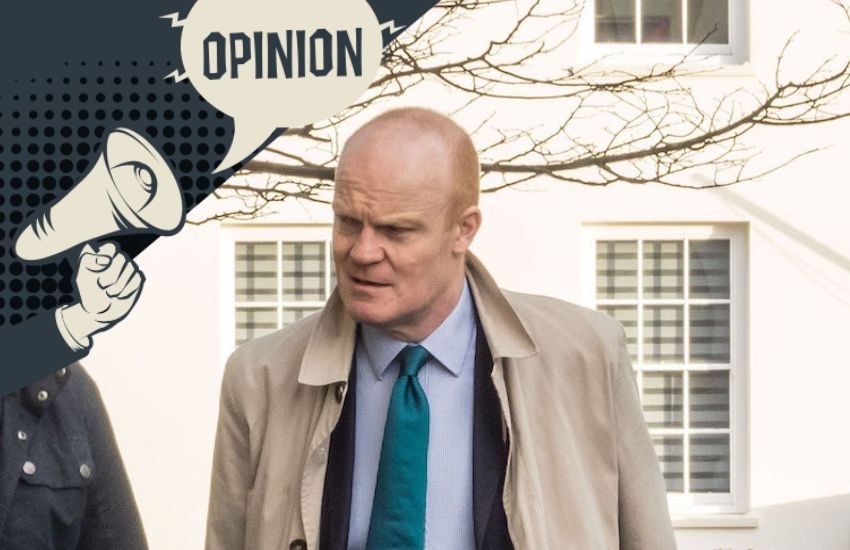


Deputy Gavin St Pier gives Express his take on last week's States debate:
"They say there is no greater zealot than a convert. And so it seems with Deputy Murray.
As candidate Murray ahead of the 2020 General Election, his manifesto promised, he would aim “for no tax increases during the next term, no GST…” Roll forward two and half years, and as the member of Policy & Resources Committee responsible for leading the debate on the Government Work Plan (GWP), Deputy Murray is no longer in the low tax camp, preaching that “taxes are an investment in our future,” that we need substantial revenue surplus and that some – he might have added, ‘other’ – members are “going to need to give up manifesto pledges.”
Deputy Prow weighed in during debate on the GWP with his view that, in essence, GST is a-coming. Responding to an intervention from Deputy Burford, whilst summing-up, Deputy Murray confirmed that the next stage of the GWP at the end of September would include GST in one of the ‘scenarios’ as this was, in his view, the responsible thing to do. Although we only have a few weeks to wait until its publication, the September policy letter’s shape is becoming apparent. It seems likely that in order to fund the capital programme, including both the ever more expensive secondary and post-16 education facilities and the hospital modernisation, as well as the extension of Alderney’s runway, borrowing will be recommended. Whilst I and others argued strongly in favour of borrowing in 2020 when we could have locked into long-term interest rates at record lows, many of us will struggle to support proposals to do so now that interest rates have risen so far.
Accompanying the proposed borrowing and in order to pay for it, will likely be that infamous ‘scenario’ including GST, now at 6% on everything except food. An alternative ‘scenario’ flagged in last week’s GWP policy letter will another look at deep cuts in other budgets. It looks like we might be headed towards a re-tread of the February debate, albeit with ‘options’ rebadged as ‘scenarios.’ If so, its difficult to see what has changed other than the elapse of seven months without any progress being made on the alternative solutions offered up in February.
Next up were the 2022 States Accounts, debate on which was led by Deputy Helyar. The staged implementation of international accounting standards means that the accounts look very different. In particular, depreciation and the movement in the value of the States’ portfolio of invested assets produces a very significant accounting deficit for the year. This presents a real and unenviable challenge to P&R to explain to the community what on earth is going on, especially at a time the committee is seeking to persuade taxpayers they need to dig a bit deeper into their pockets to fund government. Deputy Helyar made the point that there was a risk that unless Guernsey addressed its fiscal sustainability, we would be unable to do anything and become like Belgium, referencing that they had been without a government for 18 months. Of course, there are many in Guernsey who could argue with some evidence that as we’ve already had a government that has achieved almost nothing in 34 months, going full-Belgian and operating without a government for the next 18 months is likely to make little discernible difference.
Despite a very well written policy letter, Deputies Ferbrache and Prow had the challenging task of explaining to the Assembly why it was necessary to support three pieces of UK immigration-related legislation, including the infamous Illegal Migration Act. What became clear in dialogue between the Presiding Officer and HM Comptroller was the recently introduced Reform Law provision which requires the Assembly to signify its views on UK legislation with direct effect in Guernsey, only applies to draft bills, not Acts which have already been enacted in the UK. Since all the legislation before us both applied directly and had already received Royal Assent in the UK, the conclusion was a failure to signify agreement would seem to do no more than prevent the Royal Court registering the legislation locally, but it would still have direct effect. In the event, a substantial majority voted to signify agreement, leaving in abeyance the effect if the Assembly subsequently doesn’t much like the look of the more controversial parts of the Illegal Migration Act which do not have direct effect, that would instead need to be extended by Order in Council. The Assembly could do no more than be reassured by the cast-iron commitments that under those circumstances the matter would come back to the Assembly for a debate and vote on the requisite Order in Council.
The final debate of the meeting was never supposed to happen. The Assembly had received an update on the Children and Young People’s Plan but this had lodged for the record rather than for debate. In the event, the Assembly supported a motion to debate the Plan which I had laid with Deputy Soulsby. It was disappointing to note that the only one of the five members of the Policy & Resources Committee, Deputy Ferbrache, was in the Assembly to listen to and contribute to the debate, given the Plan is a key piece of work in their Government Work Plan. No doubt there was more pressing government business to attend to late on Friday afternoon."